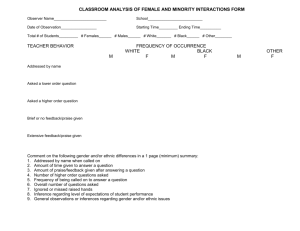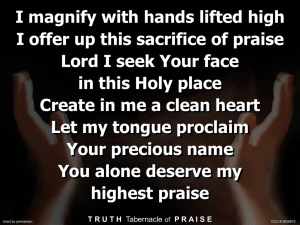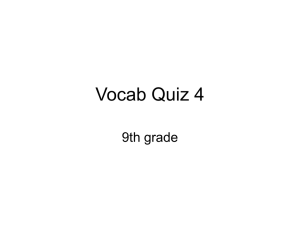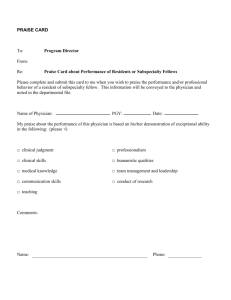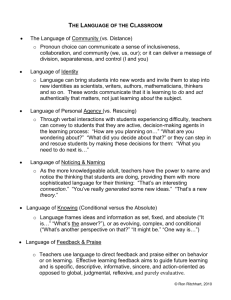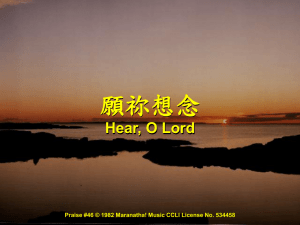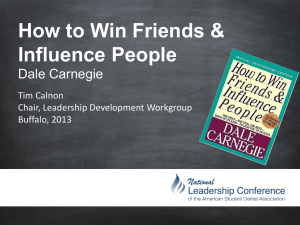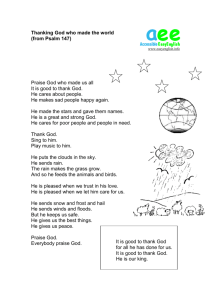HIDDEN HEROES – Chapter Three
advertisement
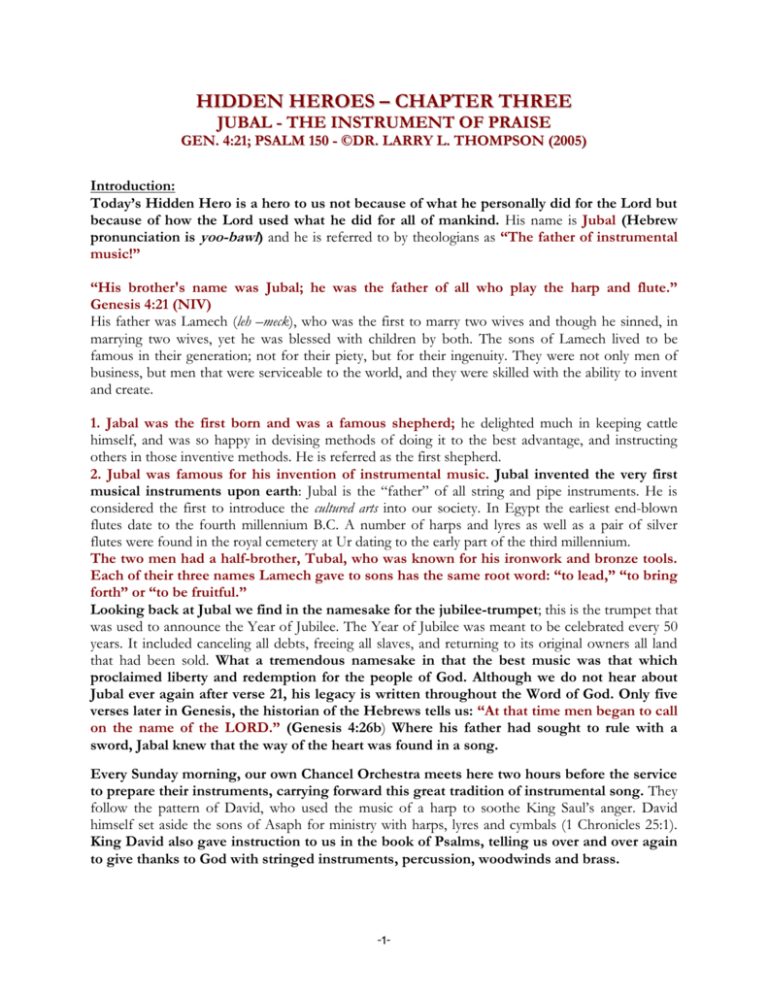
HIDDEN HEROES – CHAPTER THREE JUBAL - THE INSTRUMENT OF PRAISE GEN. 4:21; PSALM 150 - ©DR. LARRY L. THOMPSON (2005) Introduction: Today’s Hidden Hero is a hero to us not because of what he personally did for the Lord but because of how the Lord used what he did for all of mankind. His name is Jubal (Hebrew pronunciation is yoo-bawl) and he is referred to by theologians as “The father of instrumental music!” “His brother's name was Jubal; he was the father of all who play the harp and flute.” Genesis 4:21 (NIV) His father was Lamech (leh –meck), who was the first to marry two wives and though he sinned, in marrying two wives, yet he was blessed with children by both. The sons of Lamech lived to be famous in their generation; not for their piety, but for their ingenuity. They were not only men of business, but men that were serviceable to the world, and they were skilled with the ability to invent and create. 1. Jabal was the first born and was a famous shepherd; he delighted much in keeping cattle himself, and was so happy in devising methods of doing it to the best advantage, and instructing others in those inventive methods. He is referred as the first shepherd. 2. Jubal was famous for his invention of instrumental music. Jubal invented the very first musical instruments upon earth: Jubal is the “father” of all string and pipe instruments. He is considered the first to introduce the cultured arts into our society. In Egypt the earliest end-blown flutes date to the fourth millennium B.C. A number of harps and lyres as well as a pair of silver flutes were found in the royal cemetery at Ur dating to the early part of the third millennium. The two men had a half-brother, Tubal, who was known for his ironwork and bronze tools. Each of their three names Lamech gave to sons has the same root word: “to lead,” “to bring forth” or “to be fruitful.” Looking back at Jubal we find in the namesake for the jubilee-trumpet; this is the trumpet that was used to announce the Year of Jubilee. The Year of Jubilee was meant to be celebrated every 50 years. It included canceling all debts, freeing all slaves, and returning to its original owners all land that had been sold. What a tremendous namesake in that the best music was that which proclaimed liberty and redemption for the people of God. Although we do not hear about Jubal ever again after verse 21, his legacy is written throughout the Word of God. Only five verses later in Genesis, the historian of the Hebrews tells us: “At that time men began to call on the name of the LORD.” (Genesis 4:26b) Where his father had sought to rule with a sword, Jabal knew that the way of the heart was found in a song. Every Sunday morning, our own Chancel Orchestra meets here two hours before the service to prepare their instruments, carrying forward this great tradition of instrumental song. They follow the pattern of David, who used the music of a harp to soothe King Saul’s anger. David himself set aside the sons of Asaph for ministry with harps, lyres and cymbals (1 Chronicles 25:1). King David also gave instruction to us in the book of Psalms, telling us over and over again to give thanks to God with stringed instruments, percussion, woodwinds and brass. -1- There is no Psalm that better instructs us regarding the use of musical instruments in times of praise than the last of the psalms…Psalm 150. As you come to the end of the Book of Psalms, you will notice that each of the last 5 Psalms begins with, “Praise the Lord,” and each Psalm increases in praise and joy until we come to the last one in the holy hymnbook Psalm 150. For the psalmist, “praise the Lord” was definitely not a cliché but an ecstatic expression of unbridled joy! In six short verses, he uses the phrase 13 times. “Praise the Lord! Praise God in his sanctuary; praise him in his mighty heavens. [2] Praise him for his acts of power; praise him for his surpassing greatness. [3] Praise him with the sounding of the trumpet, praise him with the harp and lyre, [4] praise him with tambourine and dancing, praise him with the strings and flute, [5] praise him with the clash of cymbals, praise him with resounding cymbals. [6] Let everything that has breath praise the Lord. Praise the Lord!” Psalm 150:1-6 (NIV) The word, “praise” is derived from a Latin word which means to prize. When we praise, we are expressing our approval by valuing something or someone who has worth or merit. To praise the Lord is to prize Him and rave about Him as the only One worthy of glory and honor. Let’s look at the influence Jubal’s invention of the musical instruments has on our worship and praise today. I. Where to Praise (v.1) “Praise the Lord! Praise God in His sanctuary; praise Him in His mighty heavens.” We are to praise the eternal, strong and mighty God in “His sanctuary,” which is a reference to the temple, where God used to dwell in the Old Testament. Since Jesus Christ died and rose again, God now “tabernacles” within His people, choosing not to dwell in a building. We are His temple and should therefore live out the implications of what that means. While God does not reside in this worship center, He does reside within us. The call to praise also extends to the “mighty heavens.” The psalmist is calling the firmament, and everything above it, to break out into a celebration of praise. Verse 1 is really saying, “Praise God in heaven and on earth.” And so, verse 1 answers the question, “Where are we to praise Him?” We’re to do it everywhere. Verse 2 gives us the answer to the question, “Why are we to praise Him?” II. Why We Praise (v.2) “Praise him for his acts of power; praise him for his surpassing greatness.” We’re called to praise God for at least two reasons. Praise Him for what He does. We see this in the first part of verse 2: “Praise Him for His acts of power.” This is the theme of many of the psalms. The phrase, “acts of power” carries with it the idea of God as a champion because of the victory He has won. His acts of power are displayed in creation and in our own lives as we enjoy the benefits of His grace, forgiveness, and salvation. Some of you have great reason to praise the Lord for some recent ways in which He has demonstrated His acts of power in your life. You’ve seen Him restore a relationship, give you victory over a sin, renew your health, or answer a -2- specific prayer request. You’re praising Him today for what He’s done in your life and you should. Praise Him for who He is! In the second part of verse 2: “Praise Him for His surpassing greatness.” This is especially evident in the last group of praise psalms. Psalm 145:3 says, “Great is the Lord and most worthy of praise; His greatness no one can fathom.” Psalm 147:5: “Great is our Lord and mighty in power; His understanding has no limit.” When we praise God for who He is, we are recognizing his surpassing greatness, or as the Hebrew indicates, for His “muchness of greatness and abundant magnitude.” This is a good reminder for us. When we praise Him, we should do it for what He’s done in our lives and we should praise Him simply for who He is. III. How We Praise (v.3-5) “Praise him with the sounding of the trumpet, praise him with the harp and lyre, [4] praise him with tambourine and dancing, praise him with the strings and flute, [5] praise him with the clash of cymbals, praise him with resounding cymbals.” As we move to the next section in verses 3-5, we learn how this week’s Hidden Hero impacted the world of music and especially impacted our time of praise and worship. The music of ancient Israel was loud and boisterous. That reminds me of the Velocity Concert two weeks ago. I was visiting with the father of one of the band members who said, “This band loves Jesus, they love praising the Lord through rock and roll, and they love their music loud.” I can honestly say that he was absolutely telling the truth on all three counts! Psalm 150 describes an incredible praise band using instruments invented by Jubal. The instruments in the orchestra sounded out their praise to God. Large choirs and worship teams sang their anthems proclaiming God’s greatness. Let’s look again at how they praised: “Praise Him with the sounding of the trumpet, praise Him with the harp and lyre, praise Him with tambourine and dancing, praise Him with the strings and flute, praise Him with the clash of cymbals, praise Him with resounding cymbals.” The children of Israel used 3 types of musical instruments wind, string, and percussion and all three are used in this pinnacle of praise in Psalm 150. This list of instruments appears to be in a random order and it’s likely that each one was played when it was mentioned and continued to be heard through the last “Praise the Lord.” The first one listed is the trumpet. This was also referred to as the shophar, or ram’s horn. It was the greatest of the Jewish instruments, and could be heard from a long distance away. Several years ago it was the shophar which called men together at the ‘Stand in the Gap’ rally I attended in Washington, D.C. and it is still used in Jerusalem to announce the beginning of the Sabbath. The sound of the trumpet in the Old Testament is associated with the grandest and most solemn events, such as the giving of the Law, the proclamation of the year of Jubilee, the coronation of kings, and the emergency announcing the enemy was coming and war was -3- raging. It is the trumpet which will also be heard again when Jesus returns and the dead are raised. “Listen, I tell you a mystery: We will not all sleep, but we will all be changed-- [52] in a flash, in the twinkling of an eye, at the last trumpet. For the trumpet will sound, the dead will be raised imperishable, and we will be changed.” 1 Cor. 15:51-52 After the blast of the trumpet, verse 3 calls us to “praise Him with the harp and lyre.” We go from an explosive expression of praise to the sweet sound of strings. The harp is mentioned more than any other instrument and was played powerfully by David. Scholars believe that the harp and the lyre were similar in function and design, but the harp was probably larger. Verse 4 gives us the next instruments of worship the tambourine and dancing. This is associated with the deliverance at the Red Sea, this form of praise was jubilant and expressive. “Then Miriam the prophetess, Aaron's sister, took a tambourine in her hand, and all the women followed her, with tambourines and dancing. [21] Miriam sang to them: "Sing to the Lord, for he is highly exalted. The horse and its rider he has hurled into the sea." Exodus 15:20-21 (NIV) The playing of the tambourine was often accompanied with dancing. The Hebrew word for “dance” indicates a “twirl or a twist,” and was done in an attitude of protracted praise and adoration. The hands and the feet were both set in motion and the entire body moved in response to God’s greatness and His mighty acts of power. All I have to do is think back to Christye and Jeff Crevier’s interpretation of the Prayer in this past year’s pageant and I understand the meaning of this command. Verse 4 combines the joyful sounds of the tambourine with strings and the flute. Strings refer to instruments similar to the violin or cello. The word “flute” represents the whole class of wind instruments and has been translated “organ” in some Latin translations. Verse 5 kicks up the volume level: “Praise Him with the clash of cymbals, praise Him with resounding cymbals.” These instruments were used in religious ceremonies and were played by the priests. They made a loud, distinctive sound when banged together. When the walls of Jerusalem were dedicated in Nehemiah 12:27, “…the Levites were sought out from where they lived and were brought to Jerusalem to celebrate joyfully the dedication with songs of thanksgiving and with the music of cymbals, harps, and lyres.” The phrase, “resounding cymbals” can be translated, “the clamor of joy.” I like that. God wants us to clamor with joy. Charles Spurgeon, in his commentary on the Psalms, captures the essence of Psalm 150: “Let the clash of the loudest music be the Lord’s: let the joyful clang of the loftiest notes be all for Him. Praise has beaten the tambourine, swept the harp, and sounded the trumpet, and now for a last effort, awakening the most heavy of slumberers, and startling the most indifferent of onlookers, she dashes together the disks of brass, and with sounds both loud and high proclaims the glories of the Lord.” IV. Who Is To Praise (v.6) “Let everything that has breath praise the Lord. Praise the Lord!” -4- Verse 6 pulls it all together, “Let everything that has breath praise the Lord. Praise the Lord.” Not merely the priests and Levites, nor just the congregation, but all living creatures are included in the choir of choirs. God has given each of us breath; we’re called now to breathe His praise. This song begins and ends with the command to praise the Lord. We’re to praise Him everywhere, with every means possible because of His mighty acts, and because of who He is. And, we’re to praise Him with a wide variety of instrumentation and with triumphant expressions of worship. God desires for you and for me to live a lifestyle of spontaneous praise and remember the best instrument of praise is a man or woman, teenager, or child wholly committed to Him. We are to be a people of praise. There is nothing more majestic or more beautiful in the entire book of Psalms than this brief finale. Let us remember the impact of the Jubal, this week’s Hidden Hero as we listen to the trumpets of praise! Let’s shout it out together, vigilant to not ever let it become just a cliché. Repeat it after me: “Praise the Lord!” Conclusion: I can think of at least two applications from this psalm. 1. All of our faculties are to be engaged in praising God. The breath is used to blow the trumpet and flute; the fingers are used with the harp and strings; the whole hand hits the tambourine; the feet move in rhythm; and the arms are used to clash the cymbals together and the mouth is to sing expressions of praise. Corporate worship is not meant to be passive as if its something that we just watch or listen to. We are to be fully engaged in active worship, lifting our praise to God by engaging our head, our heart, and our hands. 2. The plurality and variety of instrumentation gives us freedom to worship God in different ways. There is not just one way to worship or just one musical style that is acceptable to God. There is a diversity of musical preferences and interests here at FBC and we consider that one of the great advantages in our church. John reminds us that worship is not what we do with our mouth but what we do with our hearts. Our voice and instruments only accompanies the heart God has given us for worship. Jubal was an inventor, the first to give us musical instruments and God used his invention to bring honor and glory to His name. Unfortunately, so many do. The Apostle Paul challenged us to have our instruments of witness ready. It’s not enough to just to have the instrument; we must be prepared to voice the Song of the Redeemed. Here’s what Paul says: “Even in the case of (inanimate) things that make sounds, such as the flute or harp, how will anyone know what tune is being played unless there is a distinction in the notes? 8Again, if the trumpet does not sound a clear call, who will get ready...? 9So it is with you.” What do you have in your life that God wants to use to bring honor and glory to His name? Don’t keep it hidden any longer -5-
